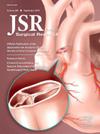得克萨斯州儿童手术验证中心治疗胃畸形和脐膨出的效果。
IF 1.8
3区 医学
Q2 SURGERY
引用次数: 0
摘要
导言:腹壁前部缺损(AWD),例如胃裂或脐膨出,通常在产前就被诊断出来,并被建议到有能力处理腹壁前部缺损和复杂相关畸形的医疗机构分娩。美国外科医生学会(American College of Surgeons)制定了儿童手术验证(CSV)计划,以确定拥有最佳儿科手术护理资源的机构。我们的目的是评估 CSV 状态对得克萨斯州出生后第一年的 AWD 治疗结果和潜在健康差异的影响:我们对婴儿进行了一项多中心流行病学队列研究:我们确定了 2282 名 AWD 患者,其中 26% 在 CSV 中心接受治疗,68% 接受腹壁手术修复。大多数(70%)患有胃裂。在 CSV 中心接受治疗的患者更有可能是非西班牙裔(64% 对 58%,P = 0.018),居住在城市县(92% 对 82%,P 结论:在 CSV 中心接受治疗的 AWD 患者更有可能是非西班牙裔(64% 对 58%,P = 0.018),居住在城市县(92% 对 82%,P = 0.018):在CSV中心接受治疗的AWD患者尽管病情复杂程度和严重程度有所增加,但其治疗效果更佳,死亡率也有所提高。CSV 中心的医疗服务因种族和居住地不同而存在差异。需要持续开展质量工作,以普遍提高质量,并表彰提供高质量护理的机构,同时确保公平获得高质量的儿科外科护理。本文章由计算机程序翻译,如有差异,请以英文原文为准。
Outcomes of Gastroschisis and Omphalocele Treated at Children’s Surgery Verified Centers in Texas
Introduction
Anterior abdominal wall defects (AWDs), such as gastroschisis or omphalocele, are often diagnosed prenatally and counseled to deliver at facilities with resources capable of managing their AWD and complex-associated anomalies. The American College of Surgeons instituted their Children’s Surgery Verification (CSV) program to identify facilities with the optimal resources for pediatric surgical care. We aimed to evaluate the impact of CSV status on the outcomes of AWD and potential health disparities in the care of AWD in the first year of life in Texas.
Materials and Methods
We performed a multicenter epidemiological cohort study of infants <1 y of age at discharge with AWD from 2013 to 2021. Data were extracted from the Texas Health Care Information Council Public Use Data File. Patients who were transferred were excluded to avoid systematic double counting.
Results
We identified 2282 AWD patients with 26% treated at CSV centers and 68% undergoing surgical abdominal wall repair. The majority (70%) had gastroschisis. CSV center care recipients were more likely to be non-Hispanic (64% versus 58%, P = 0.018), reside in urban counties (92% versus 82%, P < 0.001), or counties not along the Mexican border (98% versus 81%, P < 0.001) when compared with non-CSV patients. While non-CSV admissions had lower costs per day ($9316 versus $10,109, P = 0.003), CSV centers had slightly lower mortality although this was not statistically significant (8% versus 10%, P = 0.153) despite higher illness severity scores (extreme illness severity: 51% versus 44%, P = 0.019). However, it is notable that non-CSV centers had higher rates of prematurity (62% versus 55%, P = 0.003). Multivariable logistic regression analysis for mortality revealed that treatment at CSV centers (adjusted odds ratio 0.562, P = 0.005) was protective. Predictive modeling revealed that CSV centers have lower predicted mortality across all illness severity levels as compared with non-CSV centers.
Conclusions
AWD treated at CSV centers have superior outcomes with improved mortality despite increased patient complexity and illness severity. Disparities in care at CSV centers exist based on race and geographic residency. Ongoing quality efforts are needed to improve quality universally and recognize facilities providing high-quality care while also ensuring equitable access to high-quality pediatric surgical care.
求助全文
通过发布文献求助,成功后即可免费获取论文全文。
去求助
来源期刊
CiteScore
3.90
自引率
4.50%
发文量
627
审稿时长
138 days
期刊介绍:
The Journal of Surgical Research: Clinical and Laboratory Investigation publishes original articles concerned with clinical and laboratory investigations relevant to surgical practice and teaching. The journal emphasizes reports of clinical investigations or fundamental research bearing directly on surgical management that will be of general interest to a broad range of surgeons and surgical researchers. The articles presented need not have been the products of surgeons or of surgical laboratories.
The Journal of Surgical Research also features review articles and special articles relating to educational, research, or social issues of interest to the academic surgical community.

 求助内容:
求助内容: 应助结果提醒方式:
应助结果提醒方式:


